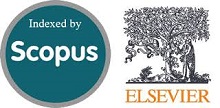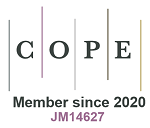Consumers’ Attitude towards Digital Social Responsibility: Impacts on Electronic Word of Mouth and Purchase Intention
Abstract
Doi: 10.28991/ESJ-2022-06-01-05
Full Text: PDF
Keywords
References
Carroll, A. B. (2017). A three-dimensional conceptual model of corporate performance. Corporate Social Responsibility, 4(4), 37–45. doi:10.5465/amr.1979.4498296.
Öberseder, M., Schlegelmilch, B. B., & Murphy, P. E. (2013). CSR practices and consumer perceptions. Journal of Business Research, 66(10), 1839–1851. doi:10.1016/j.jbusres.2013.02.005.
Chu, S. C., & Chen, H. T. (2019). Impact of consumers’ corporate social responsibility-related activities in social media on brand attitude, electronic word-of-mouth intention, and purchase intention: A study of Chinese consumer behavior. Journal of Consumer Behaviour, 18(6), 453–462. doi:10.1002/cb.1784.
Camilleri, M. A. (2019). The SMEs’ technology acceptance of digital media for stakeholder engagement. Journal of Small Business and Enterprise Development, 26(4), 504–521. doi:10.1108/JSBED-02-2018-0042.
Kucukemiroglu, S., & Kara, A. (2015). Online word-of-mouth communication on social networking sites: An empirical study of Facebook users. International Journal of Commerce and Management, 25(1), 2–20. doi:10.1108/IJCoMA-11-2012-0070.
We are Social. “Digital in 2020: Global Digital Overview.” (2020). Available online: https://wearesocial.com/digital-2020 (accessed on March 2021).
Leesa-Nguansuk, Suchit. “Thailand Tops Global Digital Rankings.” (2019). Available online: https://www.bangkokpost.com/tech/1631402/thailand-tops-global-digital-rankings (accessed on March 2021).
Lee, J. W., & Kwag, M. (2017). Corporate Marketing Strategy Using Social Media: A Case Study of the Ritz-Carlton Seoul. The Journal of Asian Finance, Economics and Business, 4(1), 79–86. doi:10.13106/jafeb.2017.vol4.no1.79.
CHAE, M. J. (2020). The Effects of Message Tone and Formats of CSR Messages on Engagement in Social Media. Journal of Asian Finance, Economics and Business, 7(10), 501–512. doi:10.13106/jafeb.2020.vol7.no10.501.
Du, S., & Vieira, E. T. (2012). Striving for Legitimacy through Corporate Social Responsibility: Insights from Oil Companies. Journal of Business Ethics, 110(4), 413–427. doi:10.1007/s10551-012-1490-4.
Golob, U., Podnar, K., Elving, W. J., Ellerup Nielsen, A., Thomsen, C., & Schultz, F. (2013). CSR communication: Quo vadis? Corporate Communications: An International Journal, 18(2), 176–192. doi:10.1108/13563281311319472.
Farzin, M., & Fattahi, M. (2018). eWOM through social networking sites and impact on purchase intention and brand image in Iran. Journal of Advances in Management Research, 15(2), 161–183. doi:10.1108/JAMR-05-2017-0062.
Tao, W., & Wilson, C. (2015). Fortune 1000 communication strategies on Facebook and Twitter. Journal of Communication Management, 19(3), 208–223. doi:10.1108/JCOM-01-2013-0004.
Fatma, M., Ruiz, A. P., Khan, I., & Rahman, Z. (2020). The effect of CSR engagement on eWOM on social media. International Journal of Organizational Analysis, 28(4), 941–956. doi:10.1108/IJOA-10-2019-1895.
Eberle, D., Berens, G., & Li, T. (2013). The Impact of Interactive Corporate Social Responsibility Communication on Corporate Reputation. Journal of Business Ethics, 118(4), 731–746. doi:10.1007/s10551-013-1957-y.
Kakirala, A. K., & Singh, D. P. (2020). The Mediating Role of Social Media in Tourism: An eWOM Approach. Journal of Asian Finance, Economics and Business, 7(11), 381–391. doi:10.13106/jafeb.2020.vol7.no11.381.
Bhattacharya, C. B., & Sen, S. (2004). Doing better at doing good: When, why, and how consumers respond to corporate social initiatives. California Management Review, 47(1), 9–24. doi:10.2307/41166284.
Lacey, R., & Kennett-Hensel, P. A. (2010). Longitudinal Effects of Corporate Social Responsibility on Customer Relationships. Journal of Business Ethics, 97(4), 581–597. doi:10.1007/s10551-010-0526-x.
Litvin, S. W., Goldsmith, R. E., & Pan, B. (2008). Electronic word-of-mouth in hospitality and tourism management. Tourism Management, 29(3), 458–468. doi:10.1016/j.tourman.2007.05.011.
Hennig-Thurau, T., Gwinner, K. P., Walsh, G., & Gremler, D. D. (2004). Electronic word-of-mouth via consumer-opinion platforms: What motivates consumers to articulate themselves on the Internet? Journal of Interactive Marketing, 18(1), 38–52. doi:10.1002/dir.10073.
Abzari, M., Ghassemi, R. A., & Vosta, L. N. (2014). Analysing the Effect of Social Media on Brand Attitude and Purchase Intention: The Case of Iran Khodro Company. Procedia - Social and Behavioral Sciences, 143, 822–826. doi:10.1016/j.sbspro.2014.07.483.
Lim, X. J., Mohd Radzol, A. R. bt, Cheah, J.-H. (Jacky), & Wong, M. W. (2017). The Impact of Social Media Influencers on Purchase Intention and the Mediation Effect of Customer Attitude. Asian Journal of Business Research, 7(2), 19–36. doi:10.14707/ajbr.170035.
Boone, L. E., & Kurtz, D. L. (2004) Contemporary Marketing, Fifteenth Edition. Thomson South-Western Publishing.
Phuong, N. N. D., & Dat, N. T. (2017). The Effect of Country-of-Origin on Customer Purchase Intention: A Study of Functional Products in Vietnam. The Journal of Asian Finance, Economics and Business, 4(3), 75–83. doi:10.13106/jafeb.2017.vol4.no3.75.
Bianchi, E., Bruno, J. M., & Sarabia-Sanchez, F. J. (2019). The impact of perceived CSR on corporate reputation and purchase intention. European Journal of Management and Business Economics, 28(3), 206–221. doi:10.1108/EJMBE-12-2017-0068.
Green, T., & Peloza, J. (2014). Finding the right shade of green: The effect of advertising appeal type on environmentally friendly consumption. Journal of Advertising, 43(2), 128–141. doi:10.1080/00913367.2013.834805.
CREYER, E. H., & ROSS, W. T. (1997). Tradeoffs Between Price and Quality: How a Value Index Affects. Journal of Consumer Affairs, 31(2), 280–302. doi:10.1111/j.1745-6606.1997.tb00392.x.
See-To, E. W. K., & Ho, K. K. W. (2014). Value co-creation and purchase intention in social network sites: The role of electronic Word-of-Mouth and trust - A theoretical analysis. Computers in Human Behavior, 31(1), 182–189. doi:10.1016/j.chb.2013.10.013.
Anderson, J. C., & Gerbing, D. W. (1988). Structural Equation Modeling in Practice: A Review and Recommended Two-Step Approach. Psychological Bulletin, 103(3), 411–423. doi:10.1037/0033-2909.103.3.411.
Kline, R. B. (2015). Principles and practice of structural equation modeling. Guilford publications.
Butt, I. (2016). Corporate Social Responsibility and Consumer Buying Behavior in Emerging Market: A Mixed Method Study. International Journal of Business and Management, 11(7), 211. doi:10.5539/ijbm.v11n7p211.
Mar García-de los Salmones, M. del, Herrero, A., & Martínez, P. (2021). Determinants of Electronic Word-of-Mouth on Social Networking Sites about Negative News on CSR. Journal of Business Ethics, 171(3), 583–597. doi:10.1007/s10551-020-04466-9.
Kwok, L., Mao, Z. (Eddie), & Huang, Y. K. (2019). Consumers’ electronic word-of-mouth behavioral intentions on Facebook: Does message type have an effect? Tourism and Hospitality Research, 19(3), 296–307. doi:10.1177/1467358417742684.
Tien, D. H., Amaya Rivas, A. A., & Liao, Y. K. (2019). Examining the influence of customer-to-customer electronic word-of-mouth on purchase intention in social networking sites. Asia Pacific Management Review, 24(3), 238–249. doi:10.1016/j.apmrv.2018.06.003.
Rovinelli, R. J., & Hambleton, R. K. (1977). On the Use of Content Specialists in the Assessment of Criterion-Referenced Test Item Validity. Dutch Journal of Educational Research, 2, 49–60.
Turner, R. C., & Carlson, L. (2003). Indexes of Item-Objective Congruence for Multidimensional Items. International Journal of Testing, 3(2), 163–171. doi:10.1207/s15327574ijt0302_5.
Awang, Z. (2015). SEM Made Simple: A Gentle Approach to Learning Structural Equation Modelling. In MPWS Rich Publication (Vol. 1, Issue 3). MPWS Rich Publication.
Vo, T. T., Xiao, X., & Ho, S. Y. (2019). How Does Corporate Social Responsibility Engagement Influence Word of Mouth on Twitter? Evidence from the Airline Industry. Journal of Business Ethics, 157(2), 525–542. doi:10.1007/s10551-017-3679-z.
Bianchi, E., Bruno, J. M., & Sarabia-Sanchez, F. J. (2019). The impact of perceived CSR on corporate reputation and purchase intention. European Journal of Management and Business Economics, 28(3), 206–221. doi:10.1108/EJMBE-12-2017-0068.
DOI: 10.28991/ESJ-2022-06-01-05
Refbacks
- There are currently no refbacks.
Copyright (c) 2022 Wilert Puriwat, Suchart Tripopsakul, Wittaya Charupongsopon






